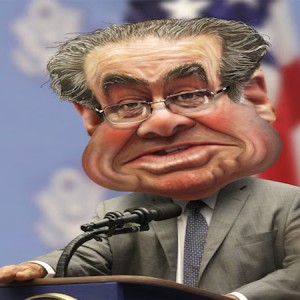Antonin Scalia was a thug in a black bathrobe. An avowed conservative when he was appointed to the Supreme Court by President Reagan, Scalia tacked relentlessly to the right over the next 30 years, bringing new meaning to the term judicial activism as he tried to disenfranchise racial minorities, women, the disabled and underprivileged — succeeding far too often — in legal decisions that were not merely an assault on the Constitution and human decency, but called into question his very sanity as ideology usually trumped common sense.
Scalia’s body was not even cold when Republicans, in a rare moment of unanimity, vowed to paralyze the high court by blocking efforts by Barack Obama to name a successor to the 79-year-old associate justice.
Republicans are fully aware that the president’s ability to nominate a third member of the court before his second and final term is over is ginormous.
The party has held a majority on the court for nearly a half century, and a Democratic-leaning majority will mean turning the court away from being a de facto arm of the GOP and begin to return it to its proper place in the balance of powers with the Executive branch and Congress by moderating the slavishly pro-big business and screw everyone else posture that has characterized many of its decisions since John Roberts became chief justice in 2005.
In that very important sense, Obama’s third nominee will be more important to the long-term health of the country than who the next president will be, and as legacies go, will fall just below implementation of the Affirmative Care Act in historic importance. I expect that nominee to be a black man with a constitutional law pedigree like his own, and can only hope that the president resists playing it safe with a middle-of-the-road pick since Republicans will oppose anyone and everyone.
“The American people should have a voice in the selection of their next Supreme Court justice,” declared Senate Majority Leader Mitch McConnell. “Therefore, this vacancy should not be filled until we have a new president.”.
Republicans know that they still are screwed if they succeed in keeping Scalia’s seat open for any length of time.
It is fully within Obama’s purview to nominate a successor and Republicans to push back. They can block any nominee with their 54-seat Senate majority remains, although a supermajority of 6o is needed to clear cloture. A long fight will roil a party already coming apart at the seams and a Republican presidential race that is the battle for the party’s soul, as well as further alienate the sane majority of the electorate. Indeed, public opinion might compel the Republicans to do what Obama can’t get them to do.
Presumptive Democratic nominee Hillary Clinton can take the high ground, and delay will be pretty much meaningless because she is the probable next president, not a reactionary stooge like Donald Trump or Ted Cruz, and if her coattails are long enough, the Senate and its all-important Judiciary Committee will return to Democratic control.
Meanwhile, the court is faced with the prospect of endless 4-4 ties until the vacancy is filled. A tie effectively leaves a decision under appeal unchanged, and the court has the option of setting cases for re-argument in the term that begins in October in the hope they can be heard by a full court.
Scalia’s brilliance was widely acknowledged and his lack of self control was legendary.
He was bypassed for chief justice because he shot off his mouth and was prone to racial slurs, wrote few of the divided Roberts court’s many 5-4 decisions because of his arcane originalist and textualist views and legally dubious and sometimes cartoonish judgments, and was the reliable fifth vote in vilified rulings including Bush v. Gore and Citizens United. He was infamous for doubling back on legal principles he previously had endorsed if they got in the way of his increasingly sclerotic views.
Scalia was determinedly opposed to social and political progress in opposing abortion rights, marriage equality, exempting the mentally disabled and younger teenagers from execution in capital cases, the Miranda decision, and perhaps most notoriously, desegregation and voter’s rights.
His view on torture was typical of his pretzel logic. He maintained that the Constitution does not prohibit torture although it prohibits “cruel and unusual punishment,” because torture is not a form of judicial punishment.
It should be noted that a recess appointment by Obama may not be outside the realm of possibilities.
President Eisenhower nominated Associate Justice Potter Stewart during an intra-session recess, and he was overwhelmingly confirmed, although in an era when there was considerably less partisan rancor. The Supreme Court has never been called on to decide the issue.
Great men and women mellow and become gracious with age. Antonin Scalia did not. As the great Reverend Gary Davis sang, death don’t have no mercy, and Scalia certainly did not. But perhaps in death we can summon just a little mercy for him despite the enormous damage he wrought to our society in trying to undermine its core values.
Editor’s Note: This essay originally appeared on February 14, 2016, on Kiko’s House, a website featuring commentary by journalist and author, Shaun Mullen. It was reproduced here with the consent of Mr. Mullen.


Leave a Reply